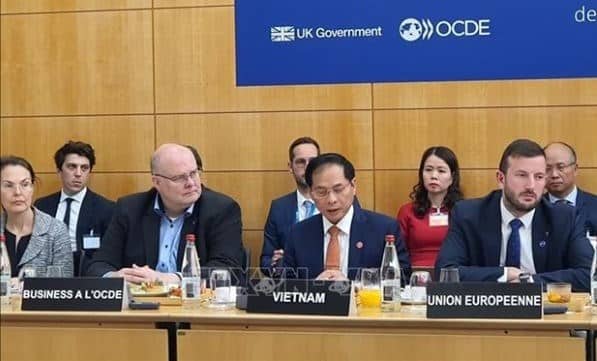
Minister of Foreign Affairs Bui Thanh Son highlighted Vietnam’s determination to achieve green transition at a panel discussion of the Organisation for Economic Cooperation Development (OECD) Ministerial Council Meeting 2023 in Paris on June 8.
Speaking at the discussion chaired by the Secretary of State for the UK Department for Energy Security and Net Zero, Son said for the green transition process to succeed, balance and equity must be ensured. It involves a strategic balance between clean energy transition and energy security, taking into account the different conditions and development levels of countries to build diverse and practical energy transition pathways. It encompasses equity in access to green technology and green finance for developing and under-developed countries. It also entails fairness in ensuring space and development opportunities among different groups of countries and communities within society, so that no individual or nation is left behind.
According to him, green transition must be carried out synchronously worldwide, and thus needing policy coordination and determination of all countries in the world.
Vietnam highly values the Inclusive Forum on Carbon Mitigation Approaches (IFCMA) of the OECD, he said, adding that IFCMA’s mission of reaching common orientations and policies at the global level is important.
Son stressed that the green transition process is a revolution that requires breakthrough thinking and actions, especially in the bold application of newer, more efficient, and smarter green technologies. To minimise the trade-offs associated with these breakthroughs, Vietnam hopes that OECD countries, which are at the forefront of technology, can pioneer the development and transfer of efficient, safe, and suitable new technologies for developing countries, he said.
The minister went on to say that Vietnam is one of the countries hardest hit by climate change. Transitioning to a green, circular, and low-emission economy has been a consistent and coherent development policy of Vietnam. Despite being a developing country undergoing transition, Vietnam has made ambitious commitments and shared responsibilities with the international community for addressing climate change. This determination has been clearly demonstrated through Vietnam’s strong commitments at the 26th United Nations Climate Change Conference (COP26), the establishment of the Just Energy Transition Partnership (JETP) with G7 countries, and most recently, the approval of the National Power Development Plan for the 2021-2030 period.
He concluded that this climate action roadmap can only succeed with the support of international friends, particularly OECD, through concessional funding, technology transfer, policymaking, governance, and high-quality workforce training.
Vietnam also looks to OECD for assistance in sustainable water management, particularly in the Mekong Delta region, he said./.
(VNA)




